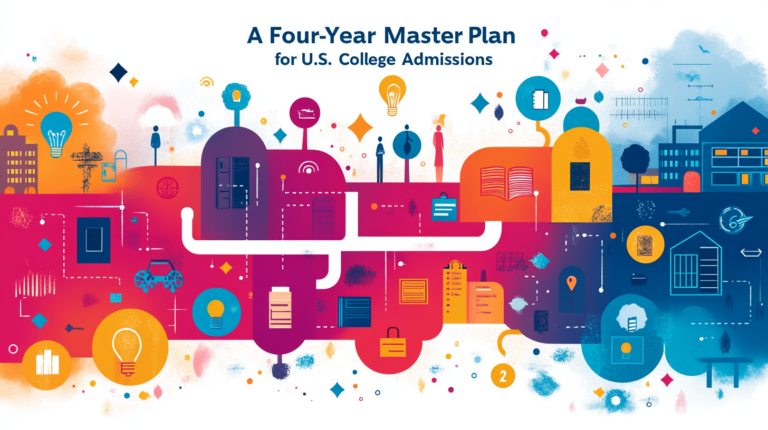12th Grade: The Final Stage of the College Admissions Journey
– A Year to Finalize Essays, Submit Applications, and Secure Financial Aid –
Senior year has finally arrived.
While many students and parents may feel that “the hard part is over,”
in truth, 12th grade is when the outcome of the college admissions process is truly determined.
✔️ Your essay is the most powerful way to present your voice and values
✔️ Applications must be submitted with strategy, organization, and precision
✔️ Financial aid forms must be completed thoroughly to access scholarships and grants
This post outlines what to do throughout the year and how parents can best support the process.
✍️ 1. College Essays: Your Strongest Tool for Personal Impact
College essays aren’t just writing assignments—they’re an opportunity to help admissions officers understand who you are.
✅ Common App Essay (Personal Statement):
- 250 to 650 words
- Choose from 7 prompts; write with authenticity
- Focus on your personal growth, values, or identity
- Start over the summer and aim to complete by the end of August
✅ Supplemental Essays (College-Specific Prompts):
- Topics may include “Why this college?”, “Why this major?”, “Community”, “Diversity”, etc.
- The more schools you apply to, the more essays you’ll need—time management is essential
📌 What makes a great essay?
- Honest and personal storytelling
- A unique perspective and authentic voice
- Thoughtful reflection and clear takeaways
🎯 Tip: The earlier you start, the more time you have for feedback and revisions.
🗂️ 2. College Applications: Strategy and Precision
College applications are not just about submitting forms—they’re about planning and execution.
✅ Choosing Application Plans:
- ED (Early Decision): Binding if accepted
- EA (Early Action): Non-binding, early notification
- Regular Decision: Standard timeline, more competitive
✅ Key Deadlines:
- ED/EA: Most deadlines in October–early November
- Regular: December to early January
- UC System: November 30
- FAFSA & CSS Profile: Submit as early as possible (ideally before December)
✅ What Your Application Includes:
- Common App or Coalition App
- Personal and supplemental essays
- Two teacher recommendations and one counselor letter
- Official high school transcript
- Activity and awards list
- SAT/ACT scores (check test-optional policies)
🎯 Tip: Use a spreadsheet or checklist to track submissions and required documents by college.
💰 3. Financial Aid: FAFSA, CSS Profile, and Scholarships
Although college can be expensive, there are many forms of financial assistance available—if you apply correctly and on time.
✅ FAFSA (Free Application for Federal Student Aid):
- Opens every year on October 1
- Submit early for the best chance at funding
- Requires parent income and asset information
- Determines eligibility for Pell Grants, federal loans, and work-study programs
✅ CSS Profile (Required by Many Private Colleges):
- Managed by College Board
- Requires more detailed financial information than FAFSA
- Deadlines vary (typically November–early December)
✅ Merit-Based Scholarships:
- Offered by colleges and outside organizations
- Based on academic achievement, leadership, talent, or major
- Often requires a separate application—check early
🎯 Tip: Financial planning can directly impact your final college decision. Start early.
👪 How Parents Can Support
- Prepare financial documents for FAFSA and CSS Profile
- Help students stay on top of deadlines and organize tasks
- Offer emotional support during essay writing—encourage, don’t edit
- Be prepared to support your child emotionally regardless of results
📌 A few words of encouragement from parents can make a world of difference.
🗓️ 12th Grade Month-by-Month Master Plan
(From the summer after 11th grade to high school graduation)
☀️ Summer Before 12th Grade (June–August)
- Create a Common App account
- Draft the personal essay
- Finalize your college list
- Prepare for or take final SAT/ACT exams
- Begin organizing financial documents for FAFSA and CSS Profile
📘 September
- Return to school and formally request teacher recommendations
- First round of essay revisions
- Begin writing supplemental essays for EA/ED schools
- Finalize resume and activities list
- Take SAT/ACT if needed
🧠 October
- Submit FAFSA as soon as it opens
- Submit CSS Profile (if required by your schools)
- Prepare for ED/EA deadlines (many fall on Nov 1)
- Finalize all essays
- Open school-specific application portals and confirm document checklists
🍁 November
- Submit Early Decision/Early Action applications
- Submit UC/Cal State applications by Nov 30
- Start working on Regular Decision applications
- Begin searching for scholarship opportunities
🎄 December
- Finalize Regular Decision applications
- Consider final SAT/ACT attempts if applicable
- Submit scholarship applications
- Make any necessary FAFSA corrections
- ED/EA results begin rolling in—prepare for Plan B
❄️ January
- Submit remaining Regular Decision applications
- Complete admissions interviews (if requested)
- Coordinate with your counselor for Mid-Year Reports
- Maintain strong senior grades
📈 February
- Attend interviews
- Continue scholarship follow-up and submissions
- Verify FAFSA submissions and make updates
- Early admissions decisions continue
🌸 March
- Regular Decision results are released
- Compare financial aid packages
- Begin final evaluation of college choices (majors, cost, location, culture)
🌱 April
- Make your final decision and submit enrollment deposit (usually by May 1)
- Visit campuses or attend admitted student days
- Apply for housing, submit health records, and register for orientation
🎓 May–June
- Prepare for graduation
- Send final transcript to your chosen college
- Write thank-you notes to recommenders and counselors
- Prepare for the transition to college (course selection, packing, etc.)
✅ Final Thoughts
12th grade is not simply the “last” year—it is the year when results are created.
Even students with weaker grades can achieve strong admissions outcomes with great essays, well-targeted applications, and disciplined organization.
Stay consistent. Finish strong.
And remember—behind every successful student is a supportive and encouraging parent.
Thank you for trusting Elite Prep.
Andy Lee
Director, Elite Prep Suwanee
📍1291 Old Peachtree Rd, NW #127, Suwanee, GA 30024
🌐 Website: eliteprep.com/suwanee
📧 Email: andy.lee@eliteprep.com
📱 Tel & Text: 470.253.1004
1:1 Educational Consulting (Online/In-Person): Consultation Request Form







